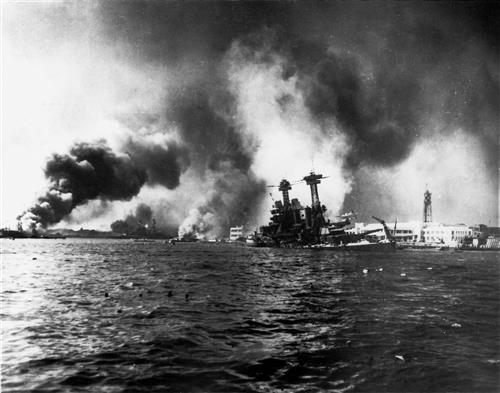 Close Topic Options
Close Topic OptionsPearl Harbor
Pearl Harbor - Politics, Business, Civil, History - Posted: 24th Jan, 2017 - 4:08pm
Pearl Harbor
Winnefeld Honors Pearl Harbor Veterans
US Military News
Navy Adm. James A. Winnefeld Jr., vice chairman of the Joint Chiefs of Staff, saluted veterans at the National World War II Memorial in Washington, D.C., during an observance marking the 71st anniversary of the Dec. 7, 1941, surprise Japanese air attack on the Pearl Harbor naval base in Hawaii.
Source: American Forces Press Service News Feed
Image from Wikimedia public domain.

Pearl Harbor (Hover)
Pearl Harbor History & Civil Business Politics
This was one of the most difficult times in America. Never before had an overseas military force been able to attack America's borders in modern times. What made it worst is we were seemingly helpless to protect our ships despite warnings.
International Level: Junior Politician / Political Participation: 100 ![]()
![]()
![]() 10%
10%
Harbor Pearl
Obama and Japan's prime minister make historic visit to Pearl Harbor
More than 75 years after Japan's devastating surprise attacks at Pearl Harbor thrust America into World War II, President Obama and Japan's Prime Minister Shinzo Abe meet at the site in the spirit of remembrance and reconciliation. Japanese leaders have visited Pearl Harbor before, but Abe is the first to visit the memorial that rests above the USS Arizona, which sank to the bottom of the harbor on Dec. 7, 1941. Obama and Abe plan to make remarks at the memorial. Ref. USAToday.
Harbor Pearl
I have talked to a survivor from the USS Arizona more than once. I remember talking with him at a veterans convention as he was telling us about how he was standing next to his brother and another guy when an explosion occured and sent him into the water.
Listening to the stories of survivors from this day as well as stories my grandfather told about that day makes all the difference in the world. Getting a clear picture of what really happened and not a bunch of hollywood hype or news twisting it to their own advantage.
Pearl Harbor
My father and uncle fought in WW II and they told me stories about this day. My dad told me that when the news broke everyone ran to the library because very few people actually knew where Pearl Harbor was. Those were definitely different times. He said the next place a lot of people went, like his brother, was to sign up for the military. My uncle signed up days later and my dad went in after he graduated college.
Pearly Harbor was quite a massacre though. The Japanese planned it to a tee, including the timing. They hit us on a sleepy Sunday morning. We were lucky in that not one of our aircraft carriers were at Pearl. What we didn't realize was losing those old battleships wasn't such a big deal. Battleships were already obsolete. The carriers were the new queens of the sea and our industry would build dozens of large and small carriers, more than every other country combined. And we actually only completely lost two battleships that day. The others that were sunk or damaged were raised and repaired and lived to fight again.
Pearl Harbor
There is a lot of speculation that Pearl Harbor could have been prevented because there were warnings from the Hawaii islands but the US government chose to ignore it because it was a good excuse to enter the European war.
International Level: Specialist / Political Participation: 40 ![]()
![]()
![]() 4%
4%
Pearl Harbor Politics Business Civil & History
I've read those theories and I just don't give them credence. Although in the yearly naval exercise earlier that year or the year before the US Nave actually simulated a surprise attack on Pearl and the results were similar. That said, everything I've read points to the fact that we thought Japan would hit us in the Philippines first.
 TOPIC: Pearl Harbor
TOPIC: Pearl Harbor USA Military News
USA Military News